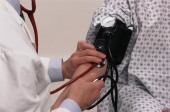
WEDNESDAY, March 12, 2014 (HealthDay News) — High blood pressure has long been pegged as a risk factor for stroke, but a new analysis suggests that even slightly elevated blood pressure levels raise the odds of suffering a stroke.
The sweeping review analyzed data from 760,000 study participants who were followed for up to 36 years. The researchers found that people with “prehypertension” — higher-than-optimal blood pressure not officially defined as high blood pressure — were 66 percent more likely to experience a stroke than those with normal blood pressure.
“This meta-analysis confirms evidence from many studies, and I think it continues to warn physicians and the public that more vigorous control of blood pressure is important for reducing stroke risk,” said Dr. Ralph Sacco, chairman of neurology at the University of Miami Miller School of Medicine, who was not involved in the research. “The findings confirm that even mild to moderate levels of elevated blood pressure are important for determining stroke risk.”
The study is published online March 12 and in the April print issue of the journal Neurology.
According to the U.S. Centers for Disease Control and Prevention, stroke is a leading killer in the United States, causing about 130,000 deaths annually. Most strokes are triggered by clots that stop blood and oxygen flow in parts of the brain. High blood pressure, defined as readings of 140/90 mm Hg or higher, affects about one of every three American adults, according to the American Heart Association.
For the new review, Chinese researchers from Southern Medical University in Guangzhou examined 19 separate studies on the risk of developing stroke in those with prehypertension, dividing them into high and low groups that placed blood pressure levels over 130/85 mm Hg in the high range. Between 25 percent and 54 percent of study participants had pre-high blood pressure, which is higher than the optimal level of 120/80 mm Hg.
Nearly 20 percent of the strokes suffered by study participants were due to pre-high blood pressure, according to the study. Those in the high-range group were 95 percent more likely to develop a stroke than those with normal blood pressure, while participants in the low-range group were 44 percent more likely.
Results were the same even after researchers adjusted for other factors influencing stroke risk such as high cholesterol, diabetes and smoking.
“A major take-away point is, even if your blood pressure has been normal, to keep tabs on it,” said Dr. John Volpi, a stroke neurologist at Houston Methodist Hospital in Texas, who was not involved in the research. “If you see it creeping up, it’s time to start asking how you can get it down.”
Sacco said the new findings are particularly important in light of recent guidelines adjusting “goal” blood pressure levels for adults over 60 years of age (without diabetes or chronic kidney disease) from 140/90 or less to 150/90 or less.
The guidelines, published last December in the Journal of the American Medical Association, were written by a group originally commissioned by the U.S. National Heart, Lung, and Blood Institute to review blood pressure guidelines.
“I think this is an area of controversy,” said Sacco, a vice president of the American Academy of Neurology and past president of the American Heart Association. “Most of us, particularly those with an interest in preventing stroke, feel that this loosening of the target over age 60 may be detrimental in stroke prevention.”
Sacco and Volpi agreed that risk factors such as heredity and age may predispose people to higher blood pressure levels, but that careful lifestyle choices can help keep levels under control.
“Losing weight, becoming more physically active and reducing sodium consumption are three key behaviors you can do to reduce blood pressure if you’re in the prehypertension range,” Sacco said. “If it can’t be controlled well enough, you’ll need to use medication. There are numerous excellent medications out there for blood pressure control, but it’s important to couple them with lifestyle changes.”
More information
The American Heart Association offers tips for controlling blood pressure.
Copyright © 2026 HealthDay. All rights reserved.

